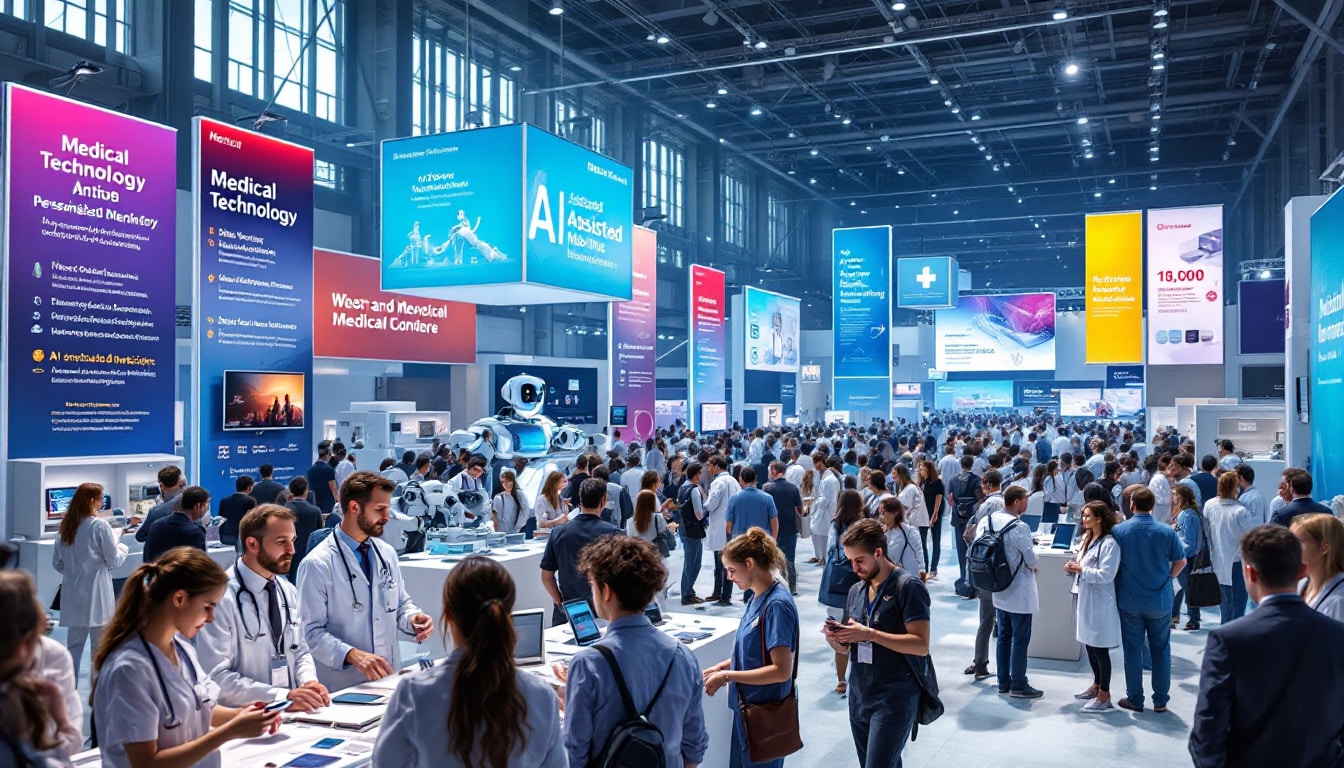Welcome to our weekly recap of Healthcare IT Today. Each week, we review the articles published and explain their significance for the health information technology community. We hope to help you catch up on what you might have missed during the week.
This week, Canadian healthcare innovators are making headlines at the Bloom Burton Healthcare Investor Conference, where the emphasis is on the importance of return on investment metrics in presentations. Patient experience is a central concern, as highlighted by a meeting between John Lynn and Russell Senger from The Beryl Institute, stressing the involvement of all organization members. The Life Sciences Today and Healthcare IT Today podcasts explored the role of AI in reducing drug development costs and improving medical diagnostics. Additionally, Dr. Andrei Gonzales presented emerging trends in cloud adoption in radiology, while Zain Qayyum discussed the rise of intelligent voice assistants in managing patient appointments. Finally, the integration of generative AI into clinical workflows was at the center of discussions during the recent Epic Expert Group meeting.
On the financing and mergers and acquisitions side, Carenet Health has acquired Balto Health Services, reinforcing its commitment to patient engagement. RadNet announced the acquisition of iCAD, specializing in mammographic analysis for breast cancer detection. Transcarent finalized its merger with Accolade, creating a new entity for virtual care. Kandu Health and Neurolutions joined forces to form Kandu, focusing on post-stroke recovery technology. Function Health expanded its offerings with the acquisition of Ezra and the launch of a full-body MRI scan for $499. Moreover, hellocare.ai raised $47 million in an oversubscribed funding round, and Assort Health secured $26 million to develop its specialized voice agents. RISA Labs and Yunu also completed significant fundraising efforts, supporting innovation in oncology AI and clinical trial workflows.

Welcome to our weekly recap dedicated to the latest innovations and news in the field of health technology. This week, we analyzed several key developments that are shaping the future of medicine and healthcare services. Here are the key points to remember.
What are the major advancements in health investments in Canada?
According to Colin Hung, reporter for the Bloom Burton Healthcare Investor Conference, Canadian healthcare innovators are increasingly attracting the attention of venture capital (VC) investors. This trend shows that pitches highlighting soft benefits without providing return on investment (ROI) metrics are no longer sufficient. The companies that succeed are those that clearly demonstrate how their innovations can generate tangible and measurable value for the healthcare sector.
How can we holistically improve the patient experience?
John Lynn met with Russell Senger from The Beryl Institute to discuss the importance of a holistic approach to the patient experience. To ensure a seamless experience, every member of the organization, from clinicians to reception staff, must be involved in the improvement efforts. This integrated approach creates an environment where the patient feels supported and valued at every stage of their care journey.
How is artificial intelligence transforming life sciences data?
In the Life Sciences Today podcast, Danny Liberman talked with Mark Klarzynsk from PEAK:AIO about the role of AI in reducing costs related to drug development and promoting sustainability. The use of AI not only speeds up the research and development process but also optimizes the resources used, contributing to a more efficient and environmentally friendly pharmaceutical sector.
What are the main challenges faced by health marketing professionals?
During the Healthcare IT Today podcast, John and Colin discussed the pressures faced by health marketers, patient experience professionals, and public relations officers at Swaay.Health LIVE. Despite an overall positive climate in San Diego, these professionals must navigate an ever-changing environment where patient expectations and technologies are rapidly evolving. Adaptation and innovation are essential to effectively meet these challenges.
What are the emerging trends in cloud adoption in radiology?
Dr. Andrei Gonzales from Merge presented the latest trends in enterprise imaging, teleradiology, and outsourcing at their latest conference. The adoption of cloud-based systems is proving to be a key success factor, offering flexibility and efficiency to radiologists. These solutions enable better workflow management and facilitate collaboration between different medical teams.
Why is AI voice finally making waves in healthcare?
Zain Qayyum from Medsender highlighted in a recent interview the growing popularity of virtual receptionists that manage patient scheduling and automatically update Electronic Health Records (EHR). The most effective tools are those that combine flexibility and ease of use, thus facilitating their integration into existing healthcare systems and improving administrative efficiency.
How can AI assess provider quality and simplify care navigation?
Dr. Daniel Stein of Embold Health explained that using smart AI allows to go beyond simple online reviews or word-of-mouth recommendations. AI can assess symptoms, understand patients’ personal health, and provide contextual advice, thus offering more precise and personalized guidance. This approach improves the quality of care and makes navigation through the healthcare system easier for patients.
What are the next steps for integrating AI into clinical workflows at Epic?
Dr. John Lee from HIT Peak Advisors attended the recent Epic Expert Group Meeting, where the focus was on the deep integration of generative AI into clinical workflows. This integration aims to automate certain administrative tasks, allowing healthcare professionals to focus more on patient care. AI is also being used to improve the user-friendliness of Epic systems and to create more intuitive interactions between users and technology.
How can real-world data identify barriers to treatment adoption?
Noah Nasser of Datma explained in an analysis on datma why pharmaceutical companies benefit from increased visibility into diagnostic workflows and treatment transfers. Understanding the real-world adoption of treatments allows companies to better target their efforts and enhance the effectiveness of market entry strategies for new drugs.
What is the future of precision diagnostics in medical imaging thanks to AI?
Thomas Kluz of Niterra Ventures highlighted at the conference that AI is not limited to basic detection but also plays a crucial role in evaluating patient cases by level of severity, identifying anomalies, and recommending appropriate interventions. This ability to offer more accurate and personalized diagnostics is transforming the practice of radiology and improving outcomes for patients.
What is the synergy between knowledge graphs and large language models?
Ben Cushing from Red Hat announced that the combination of structured information representation via knowledge graphs with the capabilities of large language models to generate text allows clinicians and researchers to quickly find relevant information. This synergy facilitates clinical decision-making and accelerates medical research by providing instant access to complex and interconnected data.
What are the latest job openings in the health IT sector?
This week, several opportunities have opened up in the health IT sector:
- Multiple positions in patient access and information management.
For more information, check out our weekly summary.
What are the latest developments in financing and mergers and acquisitions?
The health sector is experiencing intense activity in mergers and acquisitions as well as financing:
- Carenet Health has acquired Balto Health Services, a company specializing in patient engagement.
- RadNet announced the acquisition of iCAD, specializing in mammographic analysis for breast cancer detection.
- Transcarent finalized its merger with Accolade, a company providing virtual primary care and care plans.
- Kandu Health has merged with Neurolutions to form Kandu, a company specializing in neurorehabilitation.
- Function Health acquired Ezra and launched a full-body MRI scanner for $499.
- hellocare.ai, a virtual care platform, raised $47 million in a heavily oversubscribed funding round.
- Assort Health, with its specialized voice agent, secured $26 million in funding.
- RISA Labs, an oncology AI company, raised $3.5 million.
- Yunu, a provider of imaging workflows for clinical trials, completed a heavily oversubscribed funding round.
For more details, check our weekly summary.
What are this week’s bonus features?
In addition to the main news, here are some interesting facts:
- 81% of health decision-makers believe relevant data is too difficult to access.
- AI copilots can reduce clinical review time for complex visits by 40%.
For more information, visit our medtech/”>dedicated page.
How to stay informed about the latest health and IT news?
To not miss out on the latest health and IT news, join the thousands of professionals who subscribe to our daily newsletter. Get fresh stories and essential updates directly in your inbox to stay at the forefront of innovation.
This week has been rich in innovations and significant advancements in the field of health technology. Discussions highlighted the growing importance of artificial intelligence in medical diagnostics and care management, demonstrating its potential to profoundly transform our approach to health.
Initiatives such as Carenet Health’s acquisition of Balto Health Services and Kandu Health’s merger with Neurolutions perfectly illustrate the current trend towards a strategic consolidation of the sector. These moves not only expand companies’ capabilities but also foster a better integration of services, essential for providing a seamless and effective patient experience.
Moreover, the recent funding obtained by companies like hellocare.ai and Assort Health demonstrates investor confidence in innovative solutions aimed at improving patient care. These investments are crucial for accelerating the development of innovative technologies and supporting the growth of promising startups in the field.
The emphasis on patient experience, as highlighted by exchanges with Russell Senger from The Beryl Institute, underscores the importance of a holistic approach involving all stakeholders in the healthcare organization. This integrated vision is vital to meet the growing expectations of patients and optimize care pathways.
In conclusion, the week of May 17, 2025, demonstrated that innovation and collaboration remain the fundamental pillars for advancing in the health sector. By staying informed and engaged, we can continue to push the boundaries and develop solutions that will sustainably improve the health and well-being of patients.














